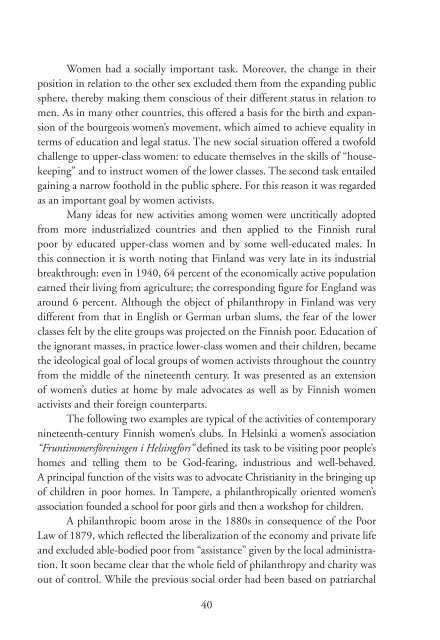Teaching Gender in Social Work - MailChimp
Teaching Gender in Social Work - MailChimp
Teaching Gender in Social Work - MailChimp
Create successful ePaper yourself
Turn your PDF publications into a flip-book with our unique Google optimized e-Paper software.
Women had a socially important task. Moreover, the change <strong>in</strong> their<br />
position <strong>in</strong> relation to the other sex excluded them from the expand<strong>in</strong>g public<br />
sphere, thereby mak<strong>in</strong>g them conscious of their different status <strong>in</strong> relation to<br />
men. As <strong>in</strong> many other countries, this offered a basis for the birth and expansion<br />
of the bourgeois women’s movement, which aimed to achieve equality <strong>in</strong><br />
terms of education and legal status. The new social situation offered a twofold<br />
challenge to upper-class women: to educate themselves <strong>in</strong> the skills of “housekeep<strong>in</strong>g”<br />
and to <strong>in</strong>struct women of the lower classes. The second task entailed<br />
ga<strong>in</strong><strong>in</strong>g a narrow foothold <strong>in</strong> the public sphere. For this reason it was regarded<br />
as an important goal by women activists.<br />
Many ideas for new activities among women were uncritically adopted<br />
from more <strong>in</strong>dustrialized countries and then applied to the F<strong>in</strong>nish rural<br />
poor by educated upper-class women and by some well-educated males. In<br />
this connection it is worth not<strong>in</strong>g that F<strong>in</strong>land was very late <strong>in</strong> its <strong>in</strong>dustrial<br />
breakthrough: even <strong>in</strong> 1940, 64 percent of the economically active population<br />
earned their liv<strong>in</strong>g from agriculture; the correspond<strong>in</strong>g figure for England was<br />
around 6 percent. Although the object of philanthropy <strong>in</strong> F<strong>in</strong>land was very<br />
different from that <strong>in</strong> English or German urban slums, the fear of the lower<br />
classes felt by the elite groups was projected on the F<strong>in</strong>nish poor. Education of<br />
the ignorant masses, <strong>in</strong> practice lower-class women and their children, became<br />
the ideological goal of local groups of women activists throughout the country<br />
from the middle of the n<strong>in</strong>eteenth century. It was presented as an extension<br />
of women’s duties at home by male advocates as well as by F<strong>in</strong>nish women<br />
activists and their foreign counterparts.<br />
The follow<strong>in</strong>g two examples are typical of the activities of contemporary<br />
n<strong>in</strong>eteenth-century F<strong>in</strong>nish women’s clubs. In Hels<strong>in</strong>ki a women’s association<br />
“Fruntimmersfören<strong>in</strong>gen i Hels<strong>in</strong>gfors” def<strong>in</strong>ed its task to be visit<strong>in</strong>g poor people’s<br />
homes and tell<strong>in</strong>g them to be God-fear<strong>in</strong>g, <strong>in</strong>dustrious and well-behaved.<br />
A pr<strong>in</strong>cipal function of the visits was to advocate Christianity <strong>in</strong> the br<strong>in</strong>g<strong>in</strong>g up<br />
of children <strong>in</strong> poor homes. In Tampere, a philanthropically oriented women’s<br />
association founded a school for poor girls and then a workshop for children.<br />
A philanthropic boom arose <strong>in</strong> the 1880s <strong>in</strong> consequence of the Poor<br />
Law of 1879, which reflected the liberalization of the economy and private life<br />
and excluded able-bodied poor from “assistance” given by the local adm<strong>in</strong>istration.<br />
It soon became clear that the whole field of philanthropy and charity was<br />
out of control. While the previous social order had been based on patriarchal<br />
40

















